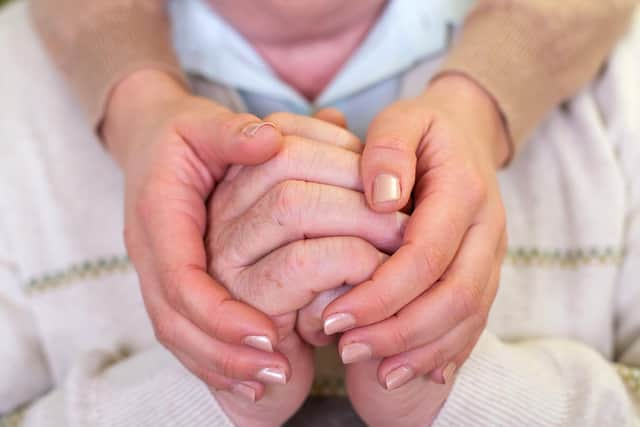Alzheimer's Society launches Emergency Appeal to help Lancashire people with dementia struggling with loneliness
and live on Freeview channel 276
Household visits and social group sizes have been restricted in many parts of Lancashire as part of an ongoing battle against the spread of Covid-19.
Staff and volunteers at the Alzheimer's Society have reached out to thousands of people with dementia who are struggling to cope, as part of the charity's Emergency Appeal. And it faces a potential loss of £45m due to a drop in donations, as demand for its services skyrockets.
Advertisement
Hide AdAdvertisement
Hide AdOne Chorley man has shared his devastating fear that people with dementia like his 89-year-old dad could rapidly deteriorate and forget who their loved ones are due to a lack of family visits.


His dad went from golfing nearly everyday and driving his own car to moving into a care home two years ago. After crashing his car, his memory began to fail. He was then admitted to Chorley Hospital after collapsing at home and suffering a double bleed on his brain. Several months later, he was diagnosed with dementia.
The 62-year-old, who remains anonymous, said: "I haven't seen my dad or been able to give him a hug since March as his care home won't let you anywhere near. I was self-isolating for a week after a holiday and then Boris Johnson brought the lockdown in.
"My dad is getting more forgetful and frailer. It can't be doing residents' mental health any good not seeing family.
Advertisement
Hide AdAdvertisement
Hide Ad"I was in a routine of seeing him at least once a week. We'd have a brew and a laugh and I'd give him a hug.
"But now I bring him shopping and staff accept it at the door and wave you off. It's been like that for five months.
"He gets upset that you can't come in. How do you explain it to him? That's one of the dilemmas.
"The home doesn't use tablets for video calls as it is confusing for people with dementia, and my dad wouldn't recognise my voice without seeing my face. Even if he saw a picture of me on the screen, he wouldn't understand.
Advertisement
Hide AdAdvertisement
Hide Ad"I've been able to look over the care home's fence twice and staff brought him to the conservatory. The first time, he didn't recognise me. The second time, he didn't understand why I couldn't come in.
"That's the danger. Will he remember me?
"Familiarity and memories are what keep him grounded. My dad can sit and tell you all day what happened to him as a lad. But if you don't have relatives coming in then he's not getting reminders of his past.
"I was due to see him at the end of June but then the care home rang me up to say that all visits were off. So we were back to square one. It's upsetting.
"The thing with dementia is you can coast along for a bit and then just dip. You can be chatting to someone with it one week and then you hear they've died. It's rapid and that's what I'm worrying about as weeks and weeks are going by and I'm not seeing him."
But the father and son aren't alone in their fears.
Advertisement
Hide AdAdvertisement
Hide AdMore than three quarters (78%) of people either living with dementia or caring for someone with the condition now feel more lonely or isolated due to lockdown restrictions, a survey of 880 participants shows. And around 37% say that is significantly so.
There are around 850,000 people living with dementia in the UK, including an estimated 16,280 in Lancashire. However, the condition, already the UK’s biggest killer, has claimed even more lives during the pandemic and left many feeling fearful and vulnerable.
Hazel Bayley, head of the North-West for Alzheimer’s Society, said: “Coronavirus has turned life upside down for the thousands of people affected by dementia; many are scared, lonely and struggling to get the help they desperately need.
“During the pandemic, our frontline team has been raising safety alerts, delivering regular welfare calls, and supporting those who have nobody else to turn to via our Dementia Connect support line.
Advertisement
Hide AdAdvertisement
Hide Ad“They have dealt with matters of life and death. But thousands more need help, and with Alzheimer’s Society facing a drop of £45 million this financial year, this lifeline is at risk, which is why we are asking people to donate to our Emergency Appeal.”
The charity is also calling for people to become a Dementia Friend. This online information session explains how the condition affects a person and how the community can help them during the pandemic.
Donations to the Emergency Appeal can be made at alzheimers.org.uk/coronavirus-appeal
To speak with a dementia adviser and access both emotional support and practical information on how to stay safe, active and social during this difficult time, call the charity's support line on 0333 150 3456, which is open seven days a week.
Comment Guidelines
National World encourages reader discussion on our stories. User feedback, insights and back-and-forth exchanges add a rich layer of context to reporting. Please review our Community Guidelines before commenting.